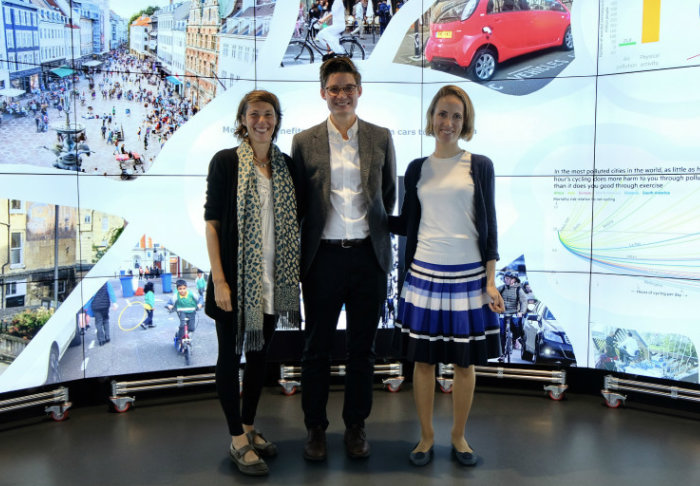Imperial researchers show world leaders how to tackle air pollution at WEF

Three Imperial academics presented their solutions to tackling air pollution to global leaders at the World Economic Forum in China.
The researchers – from Imperial’s Air Quality Network – were invited to present an IdeasLab session at the Annual Meeting of the New Champions in Tianjin.
The academics were joined by Vice President (Innovation) Professor David Gann, who was giving a talk on entrepreneurship, and Dean of the Business School, Professor Francisco Veloso.
Ten student entrepreneurs from Imperial’s Enterprise Lab were also invited to attend the Forum - first time we’ve been invited to bring a delegation of start-ups.

Vice President (Innovation) Professor David Gann, said: “Imperial is China’s top research collaborator in the UK and we are keen to strengthen our great links with industry and our extensive alumni network.
“Imperial’s academics will present ideas for reducing air pollution – a global challenge damaging the lives of citizens in China and the UK. They will be able to influence CEOs and world leaders, helping provide solutions to one of the major causes of health problems.
“Our student entrepreneurs are keen to discover key trends that will shape the world economy and how this could impact the development of new businesses, focusing particularly on rapidly expanding Chinese markets.”

Air pollution solutions
Air pollution is now the fourth biggest killer in the world and contributes to more than six million deaths every year. To help find solutions posed by air pollution in major cities such as London and Beijing, Imperial has recently launched an Air Quality network – which is identifying the next big frontiers in air quality research.
Cities without cars?

Dr Audrey de Nazelle, from Imperial’s Centre for Environmental Policy, says that the main reason for reducing air pollution is to benefit health.
Dr de Nazelle said: “There is an exciting opportunity to go much further, and fundamentally rethink the way cities work – such as making streets safe places for walking, cycling and playing.
By removing cars from cities, toxic emissions are reduced but there are countless other benefits – such as to people’s health and wellbeing. Air pollution can spur us to transform public health and infrastructure, and change how we design cities in the future.”
Writing ahead of the conference in the article ‘What would happen if we removed cars from cities? for WEF Agenda, Dr de Nazelle explains her bold idea.
Tackling transport’s air quality problem

Dr Marc Stettler, from the Department of Civil and Environmental Engineering, and his colleagues have been testing a real-time vehicle emissions monitoring system in diesel, gasoline and hybrid cars to try and gain a clearer picture of their real-world emissions.
Dr Stettler said: “In general, we found that diesel cars are worse for nitrogen oxides but better than petrol cars in terms of carbon dioxide emissions. It potentially leads to a trade-off that we have to face about what’s more important to us: is it air quality, or is it climate change?”
Drivers could also potentially be provided with real-time feedback on their vehicles’ emissions to encourage them to drive in a less polluting way.
For instance, some studies have suggested that aggressive driving that involves a lot of sharp acceleration and braking can as much as double the amount of nitrogen oxides emitted by vehicles, it also increases fuel consumption, potentially costing the driver money.
Accounting for Pollution in our Decision Making – Precisely Wrong or Roughly Right?

Dr Laure de Preux, from the Business School, is helping local authorities quantify the ‘hidden costs’ of air pollution.
Dr de Preux has developed tools that can estimate reductions in costs to health services by introducing schemes to reduce pollution.
Dr de Preux. “If we can’t quantify the health benefits associated with an intervention, or convert them into monetary units, then they are simply ignored from any of economic evaluation. Reducing traffic then represents a huge monetary cost, with little financial saving. Health benefits are harder to quantify in monetary units.”
The Annual Meeting of the New Champions is the foremost global summit on innovation, science and technology, promoting entrepreneurship in the global public interest.
--
Image credit (main): Liu Xiaoge, Nouvelles d'Europe
Article text (excluding photos or graphics) © Imperial College London.
Photos and graphics subject to third party copyright used with permission or © Imperial College London.
Reporter
Stephen Johns
Communications Division